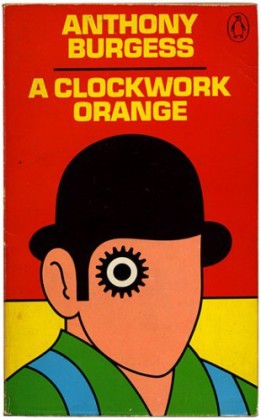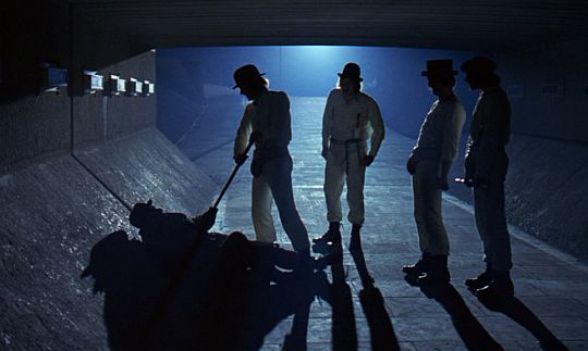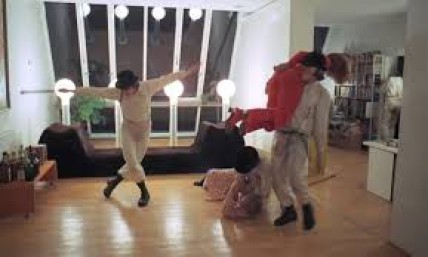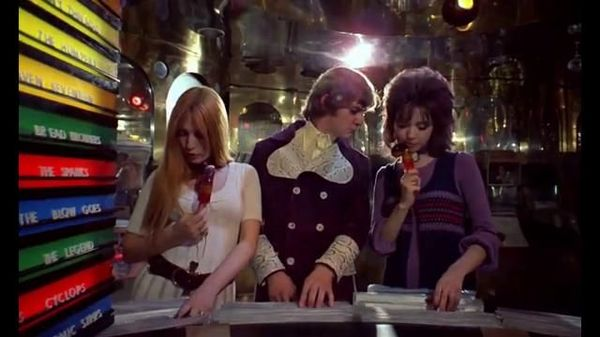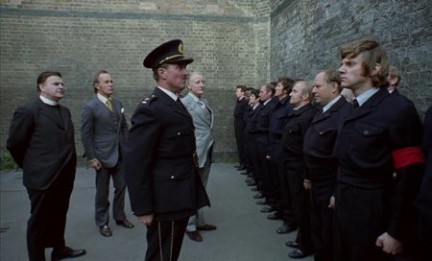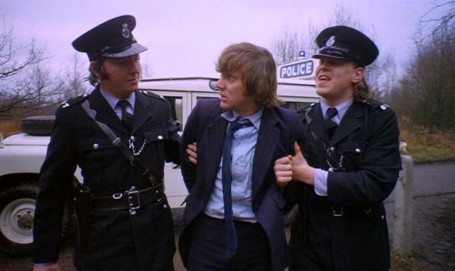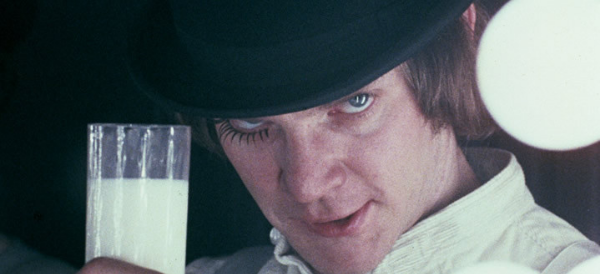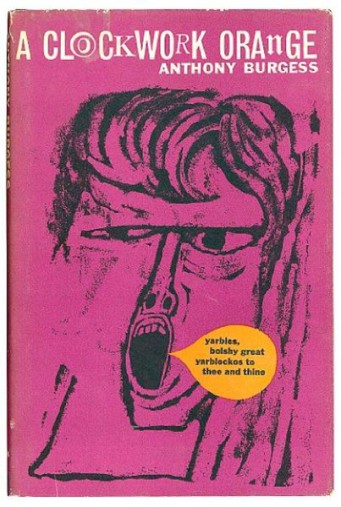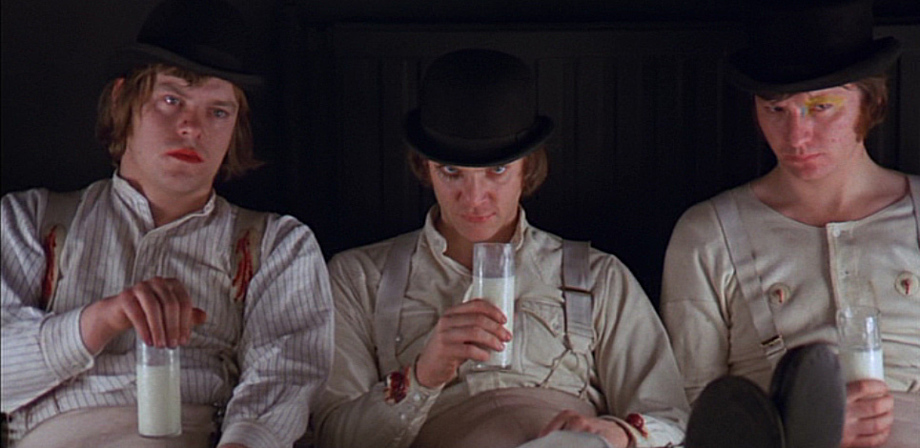
A CLOCKWORK ORANGE (1971)
Adapted from the short novel by Anthony Burgess published in 1962
'What's it going to be then, eh?
There was me, that is Alex, and my three droogs, that is Pete, Georgie and Dim, Dim being really Dim, and we sat in the Korova Milkbar making up our rassoodocks what to do with the evening, a flip dark chill winter bastard though dry. The Korova Milkbar was a milk-plus mesto, and you may, O my brothers, have forgotten what these mestos were like, things changing so skorry these days and everybody very quick to forget, newspapers not being read much either...
...you could peet milk with knives in it, as we used to say, and this would sharpen you up and make you ready for a bit of dirty twenty-to-one, and that was what we were peeting this evening I'm starting off the story with.
So begins Burgess' famous novella (only 150 pages), whilst this of course is the start of Kubrick's equally famous and iconic film version:
Burgess' book tells the story of 15 year old Alex (Malcom McDowell, although he turns in a brilliant performance, is way too old for the part at 27) and his droogs, who spend their evenings in rape, robbery. muggings and finally murder. The story is in three distinct sections, each of 7 chapters, about 50 pages each; the first relates Alex's one evening and a day before he is arrested for murder, the second is set two years later with Alex in prison and then undergoing the famous Ludovico treatment, and the final section commences with him being released from prison, unable to carry out any acts of violence before balance is restored. However of course there is a big difference between the book ending and the film ending, as we shall see.
The book is told in the first person by Alex, who uses an extreme form of teenage slang, known as nadsat, which is much toned down in the film.
How bad is Alex?
What is also toned down from the book is the violence that Alex and his gang unleash; in the film Alex and his droogs brutally beat an old tramp they find in an underground pass, then go on to rape the wife of the writer F Alexander (Patrick Magee) and beat and kick him, before Alex attacks the Cat Woman (Miriam Karlin) and (accidentally to some extent) killing her with one of her own art works, a giant phallus. Whilst some of this is black comedy, there is no doubt that Alex is a pretty unpleasant character, despite his love of classical music and witty narration.
What is not much remarked upon is that, despite A Clockwork Orange being much criticised on its release for its depiction of violence, it is actually considerably toned down from the book.
In Burgess' original, the gang first of all encounter an old man ("a doddery starry schoolmaster type veck") and rip up the books he is carrying, taking out his false teeth and grinding them into the ground ("Pete held his rookers and Georgie sort of hooked his rot wide open for him and Dim yanked out his false zoobies, upper and lower. He threw these down on the pavement and then I treated them to the old boot-crush, though they were hard bastards like, being made of some new horrorshow plastic stuff") before tearing at some of his clothes as he staggers off.
They then rob a shop, attacking the owner and his wife, with Alex considering raping her during the fight:
So we had her down on the floor and a rip of her platties for fun and a gentle bit of the boot to stop her moaning. And, viddying her lying there with her groodies on show, I wondered should I or not, but that was for later on in the evening.
When Alex and the others then meet Billyboy and his droogs, in the film they are clearly about to rape a young woman, and the ensuing fight is played for comic effect, to the strains of Rossini. In the book, however, the potential victim is reckoned by Alex to be "not more than ten" - a sobering thought.
The scene with Alex meeting two young women at the record shop, before getting them back to his room and having sex wtih them at high speed to the music of the William Tell overture, is played almost entirely for comedy; the book is completely different, and is quite horrible and nauseating. Both girls are, again, apparently only about ten years old, and Alex gets them drunk before drugging and raping them:
What was actually done that afternoon there is no need to describe, brothers, as you may easily guess all....I leapt on these two young ptitsas. This time they thought nothing fun and stopped creeching with high mirth, and had to submit to the strange and weird desires of Alexander the Large, which, what with the Ninth and the hypo jab, were choodessny and zammechat and very demanding, O my brothers. But they were both very very drunken and could hardly feel very much....They looked like they had been in some big bitva, as indeed they had, and were all bruised and pouty.
Once one reads the original, it is clear why Kubrick could not film the novel as written.
The real weepy and like tragic part of the story
The middle part of the book and film focuses on Alex's life in prison, his dealings with the prison chaplain, and his agreeing to undergo the Ludovico treatment. My favourite role in the film is Michael Bates' portrayal of the prison warden, with this clip containing a trimmed down voiceover compared to the book:
...this is the real weepy and like tragic part of the story beginning, my brothers and only friends, in Staja (State Jail, that is) Number 84F. You will have little desire to slooshy all the cally and horrible raskazz of the shock that sent my dad beating his bruised and kroovy rookers against unfair like Bog in his Heaven, and my mum squaring her rot for owwwww owwwww owwwww in her mother's grief at her only child and son of her bosom like letting everybody down real horrorshow. Then there was the starry very grim magistrate in the lower court govoreeting some very hard slovos against your Friend and Humble Narrator, after all the cally and grahzny slander spat forth by P.R.Deltoid and the rozzes, Bog blast them.
The prison scenes are, for me, the best in the film, largely thanks to Bates and Godfrey Quigley as the prison chaplain, but even here it is often forgotten that Alex again kills someone, another prisoner who is the seventh person placed in a cell meant for three:
So they all stood around whilst I cracked at this prestoopnick in the near dark. I fisted him all over, dancing about with my boots on though unlaced, and then I tripped him and he went crash crash on to the floor. I gave him one real horrorshow kick on the gulliver and he went ohhhh, then he sort of snorted off to like sleep...
This is what leads to Alex being picked out for subjection to the Ludovico treatment, and the rest of the middle section follows the book very closely, although it is mentioned at one point that Georgie, one of Alex's droogs, has been killed during a robbery.
As Alex is 'cured', and released after serving two years of his sentence, the film follows the book very closely again, apart from a few insignificant but nevertheless interesting alterations; Alex is set upon by the old tramp and others in the film, whereas in the book it is the bibliophile and others in a public library, and the two police officers who 'rescue' him in the book, only to beat him up again, are Dim and their old adversary Billyboy, not Georgie as in the film. It is also possible to see that Alex's name in all the papers is now Alex Burgess!
The scene below is pretty much word for word lifted from the book however; strange how Anthony Sharp's Minister of the Interior (or Inferior, as Alex keeps calling him) reminds me so much of Michael Howard:
The ending - was Alex 'cured all right'?
In the film, of course, this is pretty much where it ends, with Alex's final words 'Oh yes, I was cured all right' being the last words of the 20th chapter. Famously, the story goes that there was no 21st chapter in the American edition, which is what Kubrick worked from when scripting the film, and why the film ends when it does.
I have always been totally unconvinced by this explanation, mainly because it is very unconvincing (is it really true that nobody, at any stage, told Kubrick or his team that there was another chapter?!). Far more likely,I feel, is that Kubrick become aware, perhaps late on, that he had missed the last chapter, but then realised that his ending was far superior - which it surely is?
The last chapter of the book has a circular feel, beginning in an identical fashion to the frist chapter:
'What's it going to be then, eh?'
There was me, Your Humble Narrator, and my three droogs, that is Len, Rick and Bully, Bully being called Bully because of his bolshy big neck and very gromky goloss which was just like some bolshy great bull bellowing auuuuuuuuh. We were sitting in the Korova Milkbar making up our rassoodocks what to do with the evening, a flip dark chill winter bastard though dry.
But Alex's heart is not in it any longer ("But somehow, my brothers, I felt very bored and a bit hopeless, and I had been feeling that a lot these days") and after he is caught out with a photo of a baby in his pocket he leaves the others to their crasting and tolchooking and, after meeting Pete again in a cafe (who is with his wife, and is a totally changed character) he realises what is the matter with him:
Walking the dark chill bastards of winter streets after ittying off from this chai and coffee mesto, I kept viddying like visions, like these cartoons in the gazettas. There was Your Humble Narrator coming home from work to a good hot plate of dinner, and there was this ptitsa all welcoming and greeting like loving. But I could not viddy her all that horrorshow, brothers, I could not think who it might be. But I had this sudden very strong idea that I I walked into the room next to this room where the fire was burning away and my hot dinner laid on the table, there I should find what I really wanted, and now it all tied up, that picture scissored out of the gazetta and meeting old Pete like that. For in that other room in a cot was laying gurgling goo goo goo my son. Yes yes yes, my brothers, my son. And now I felt this bloshy big hollow in my plott, feeling very surprised too at myself. I knew what was happening, O my brothers. I was growing up.
This is particularly unlikely, given that Alex is still only 18. Kubrick's ending is easily superior, as Alex is restored to his old ways with the full connivance of the government.
Both book and film are easily and cheaply available, it looks as though you can see the whole film on youtube, and there are lots of documentaries etc on there as well, if not the DVD is cheap (less than £4 on play.com for the basic edition without any extras). This is all a far cry from when I first saw the film (1987) when someone at the BBC where I worked got hold of a poor quality bootleg copy (Kubrick having withdrawn the film from exhibition).
The book can also be bought cheaply, less than £2 in the UK second hand (abebooks.co.uk), or not much more new.
My general view of the film has always been that it works best as a black (very black, in some places) comedy, which is partly tied up with my first viewings of the film, with a like-minded group of friends at the Beeb where we all worked. Since reading the book however, I have a more ambivalent view of the film, as in some respects it trivialises the violence, especially the sexual violence, that runs through the story. And yet, it is ironic that the film ends on a bleaker note, whilst the book is more optimistic (although it is a disingenuous optimism in my opinion). I'm sure many people have their own views, please get in touch via the contact page with your thoughts.
